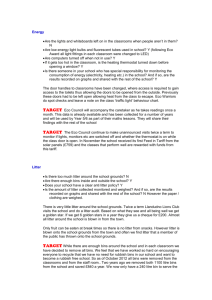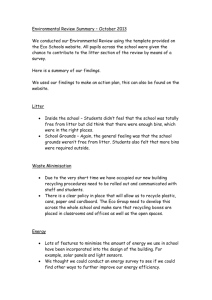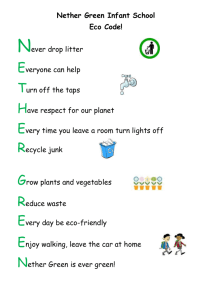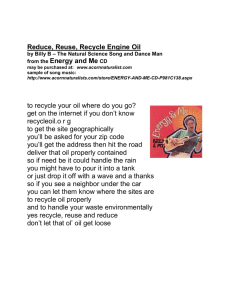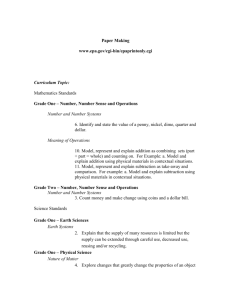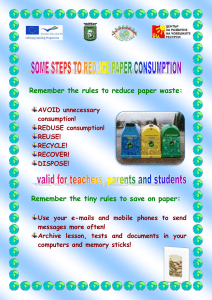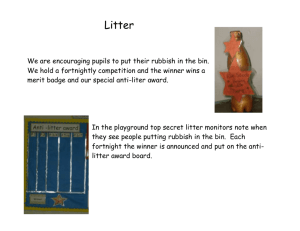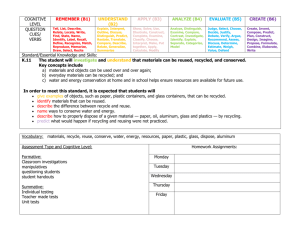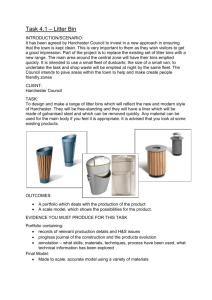Environmental Review
advertisement
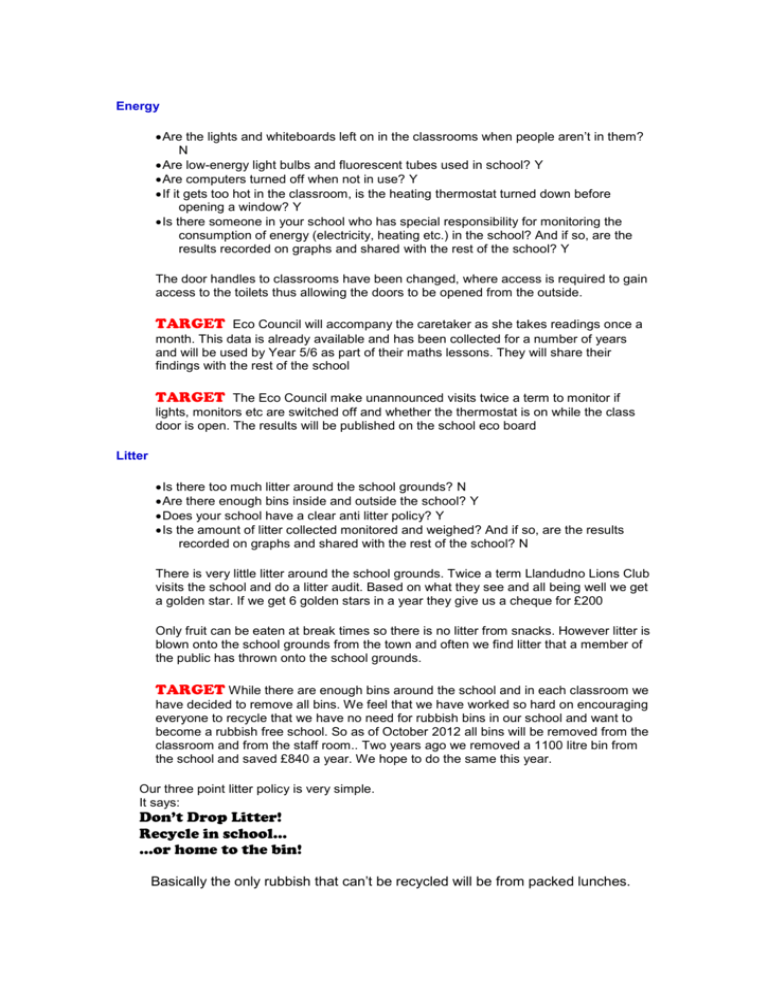
Energy Are the lights and whiteboards left on in the classrooms when people aren’t in them? N Are low-energy light bulbs and fluorescent tubes used in school? Y Are computers turned off when not in use? Y If it gets too hot in the classroom, is the heating thermostat turned down before opening a window? Y Is there someone in your school who has special responsibility for monitoring the consumption of energy (electricity, heating etc.) in the school? And if so, are the results recorded on graphs and shared with the rest of the school? Y The door handles to classrooms have been changed, where access is required to gain access to the toilets thus allowing the doors to be opened from the outside. TARGET Eco Council will accompany the caretaker as she takes readings once a month. This data is already available and has been collected for a number of years and will be used by Year 5/6 as part of their maths lessons. They will share their findings with the rest of the school TARGET The Eco Council make unannounced visits twice a term to monitor if lights, monitors etc are switched off and whether the thermostat is on while the class door is open. The results will be published on the school eco board Litter Is there too much litter around the school grounds? N Are there enough bins inside and outside the school? Y Does your school have a clear anti litter policy? Y Is the amount of litter collected monitored and weighed? And if so, are the results recorded on graphs and shared with the rest of the school? N There is very little litter around the school grounds. Twice a term Llandudno Lions Club visits the school and do a litter audit. Based on what they see and all being well we get a golden star. If we get 6 golden stars in a year they give us a cheque for £200 Only fruit can be eaten at break times so there is no litter from snacks. However litter is blown onto the school grounds from the town and often we find litter that a member of the public has thrown onto the school grounds. TARGET While there are enough bins around the school and in each classroom we have decided to remove all bins. We feel that we have worked so hard on encouraging everyone to recycle that we have no need for rubbish bins in our school and want to become a rubbish free school. So as of October 2012 all bins will be removed from the classroom and from the staff room.. Two years ago we removed a 1100 litre bin from the school and saved £840 a year. We hope to do the same this year. Our three point litter policy is very simple. It says: Don’t Drop Litter! Recycle in school… …or home to the bin! Basically the only rubbish that can’t be recycled will be from packed lunches. TARGET All children took the policy home to share with their parents and were challenged to colour the poster and return it to school for a prize. Even the teachers were asked to take part. Waste/Recycling Are paper, inkjet cartridges, and plastics, cardboard or other materials recycled? Y Is your food waste composted? Y Where possible, does the school buy paper, pens, pencils etc made from a recycled source? Y Is the reusing of materials e.g. Water bottles encouraged? Y Is the amount of waste collected monitored and weighed? And if so, are the results recorded on graphs and shared with the rest of the school? Y The companies send us results detailing how much paper and clothing is recycled. We recycle paper. We recycle plastic. We recycle metal. We recycle food. We recycle chicken waste. We recycle the reptiles’ old bedding. We recycle clothes. We recycle kitchen oil. We recycle batteries. We recycle cardboard. We recycle our pencil shavings. We recycle old inkjets from the printers and photocopiers. We recycle everything we can……… We are getting rid of all the bins from the classrooms and staff rooms so there should be no rubbish at our school We make excellent compost which we put on our vegetable plots. We have three large recycling pits. We even use the chicken waste because it improves the soil. We make a real effort to photocopy and print double sided. We have a sibling list by the photocopier and older pupils who have a younger sibling don’t get a letter to take home. We also send letters by e-mail and encourage parents to receive e-mailed letters over paper letters. We also offer a texting service to parents. Whenever possible we reuse old envelopes. TARGET We will put a tray by the photocopier to collect single sided photocopies so we can use the paper for drawing. TARGET We will again write to parents to encourage them to take e-mailed letters over paper letters. Our aim will be to have paper free communication. TARGET As part of the work we do in class we will monitor the amount of rubbish that is recycled Water Is there a water meter to record water use in school? Y Are there push-on or self stopping taps in the toilets? Y in some Are there water saving devices in the toilets? N How often does the school run water-saving campaigns? N Are pupils involved in taking and displaying readings? And if so, are the results recorded on graphs and shared with the rest of the school? N The push taps are ineffective as the children in the infants push them too hard and they run for longer than if they were ordinary taps. TARGET We will write to the water company to ask for water hippos for the toilet cisterns TARGET We will record the water meter every month Transport Does the school have dry and secure cycle storage? Secure but not dry Does the school organise regular ‘walk to school’ or ‘cycle to school’ events? N Does the school have a school travel plan? N Do you monitor how pupils travel to school? And if so, are the results recorded on graphs and shared with the rest of the school? N TARGET Eco council will carry out a survey and see how the children get to school and the mode of transport used. This will be displayed as a pie graph around the school and we will see if we can increase the number of children that walk to school through walk to school activities. Healthy Living Does the school provide and promote healthier food at break times and lunchtimes? Y Is drinking water available in class? Y Do the children take part in daily exercise? Y Do you monitor whether children eat a balanced lunchtime diet over the week? And if so, are the results recorded on graphs and shared with the rest of the school? Y TARGET We will restart the SNAG group and will ensure that the group meets twice a term Biodiversity Does the school have any plants in containers, pots or beds in the school grounds? Y Do the school grounds have a wildlife or conservation area? Y Do you monitor how many different types of wildlife visit your school grounds? And if so, are the results recorded on graphs and shared with the rest of the school? Y The school has three quite distinct gardens Gardd y Ddraig has recently been redesigned by planting plants to attract bees and butterflies. A lovely mural made with recycled tiles depicts the story of the Welsh dragon. Seating allows the children to enjoy the area and indigenous Welsh varieties of apple trees eg Afal Enlli have been planted here. Gardd Gloyn Byw now has an oak framed structure and can be used for a variety of lessons. The oak was sourced locally. The pond is rich in wildlife and children use it regularly for pond dipping activities. A number of bug boxes have been installed and the bird tables are used to attract birds. Electricity points have been installed allowing moth traps to be used more flexibly. The footpaths have been redone with different materials allowing partially sighted children to enjoy the experience more. Whenever possible photos of insects caught in the traps on found ion the school grounds are recorded on the school web site. TARGET Complete the Bug Hotel TARGET Make more resource boxes and fill with bug boxes, magnifying glasses, etc Gardd Cudd has an oak framed structure and is used by the children during many lessons and is also an area they can sit quietly to contemplate. The steps leading to this garden have recently been redone. The sycamores have been thinned and additional trees planted. TARGET Install more benches where the pond used to be Vegetable plots, recycled greenhouse and compost bins are used daily. Eggs from the chicken run are used by the children for cookery activities and by the school kitchen. Orchard is now developing nicely with indigenous Welsh variety of fruit trees, apples, plums, pears. Willow tunnels have been planted as a feature of the orchard. More oak, beech and birch trees have been planted on the school field School Grounds Are lessons or part of lessons ever held outside? Y Does the school recycle garden or fruit/vegetable waste in a composter or wormery? Y Are there seating areas in your play ground? Y Is the amount of time spent outside in the playground doing curriculum activities monitored? And if so, are the results recorded on graphs and shared with the rest of the school? TARGET While not monitored the children spend a good portion of the week outside. The teachers will now record how they will use the school grounds each term to enrich their curriculum Global Citizenship Do pupils consider how actions taken within the school affect people and the environment locally and globally? Y Have the pupils considered other issues, such as Fair Trade? Y Are the amount of Fair Trade products that the school uses monitored and evaluated? And if so, are the results recorded on graphs and shared with the rest of the school? N The school council have asked the teachers to purchase fair trade tea, coffee and sugar products for the staff room. The school has links with schools in Malawi and also raise funds to help the Madagascar Development Fund. The school is applying for a British Council Connecting Classrooms grant to link the Malawi school as an Eco School. Green Procurement Does the school have a green procurement policy? N (NB: There will be a requirement to develop a green procurement policy from Jan 2013) Does school ensure that all products and services purchased have a minimal impact on the environment (i.e. Green Procurement)? Y Does the school buy local products? Y whenever possible Does the school buy products that are recycled or that can be recycled? Y when possible Does the school buy products that use fewer chemicals? Y Does the school buy products that are energy saving? Y TARGET Write a green procurement policy. TARGET Lobby the teachers and secretary to purchase recycled paper and books made with recycled fibre and explain why this is important, Pupil Participation Do any environmental issues feature in school assemblies? Y Are there special environment-related lessons or visits undertaken by classes? Y Are pupils involved with local environmental projects outside school time? Y The school has an Eco Club that meet every week to maintain the school gardens and to undertake ecology type projects e.g. pond dipping, moth trapping TARGET Teachers to record how the school grounds / school menagerie are used each term to enrich the curriculum.
